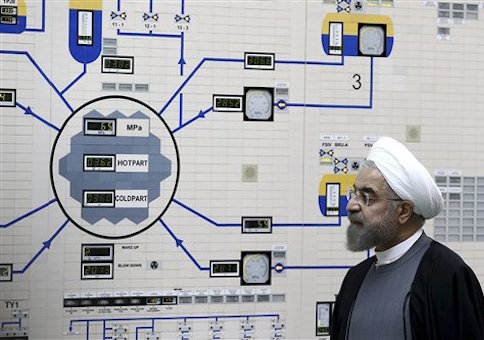A senior official in the State Department admitted on Wednesday that the Obama administration’s goal during negotiations with Iran is delaying the regime’s development of nuclear weapons rather than shutting down the Islamic Republic’s contested nuclear program.
Deputy Secretary of State Tony Blinken acknowledged during a tense exchange with senators on Capitol Hill a deal being sought by the Obama administration that would constrain its nuclear breakout capability without eliminating its nuclear program.
Blinken also floated the possibility of extending nuclear talks past the June deadline should additional time be needed to finalize details of a possible deal with Iran.
Leading senators on both sides of the aisle grilled Blinken and other officials in the administration over Iran’s nuclear program, which has continued despite restrictions imposed under an interim nuclear agreement made in November 2013.
Many believe that the interim deal has done little to halt the program and allows the regime to continue some of its most controversial nuclear operations, including the construction of new reactors and work on ballistic missiles.
"Let me ask you this, isn't it true that even the deal that you are striving towards is not to eliminate any Iranian [nuclear] breakout capability, but to constrain the time in which you'll get the notice of such breakout capability?" Sen. Robert Menendez (D., N.J.), a vocal critic of the White House’s dealings with Iran, asked Blinken during Wednesday’s Senate Foreign Relations Committee hearing. "Is that a fair statement, yes or no?"
"Yes, it is," Blinken responded.
This admission appeared to frustrate and anger Menendez, who accused the administration of issuing "talking points that come straight out of Tehran."
"We're not eliminating Iran's ability to break out," Menendez said. "We're just getting alarm bells, and the question is how long are we going to get those alarm bells for?"
Asked at a later point in the hearing if the administration would consider prolonging talks yet again, Blinken said that this is a possibility.
"We might want a little more time," he said. "That’s possible. I wouldn’t want to rule it out."
Under the terms of the interim agreement, which the administration claims has "halted" Iran’s progress, Tehran can still enrich uranium up to a point, pursue unlimited construction of plutonium light water reactors, and advance its ballistic missile program.
Iran has enriched enough uranium to fuel two nuclear bombs in the past year, according to experts.
Menendez expressed particular frustration with the administration’s attempts to appease Iran, even as it blatantly continues nuclear work during the talks.
"The bottom line is, they get to cheat in a series of ways—and I'll call it ‘cheat,’ you won't—but they get to cheat in a series of ways and we get to worry about their perceptions," Menendez said.
Despite the pressure from Menendez and others, Blinken was adamant that the administration opposes any new sanctions on Iran, even if they were scheduled to take effect only if negotiations fail.
Bliken also made clear his opposition to Congress holding an up or down vote on any possible deal that the administration may agree to.
"Why would you oppose Congress weighing in on an issue of this importance?" asked Sen. Bob Corker (R., Tenn.), the committee’s chairman, who has championed legislation that would give Congress a final say over the deal.
Corker described a White House that "continues to stiff arm every effort" and "push away Congress, who represents more fully this nation than the negotiators."
Blinken said that the administration is apprehensive about a possible congressional role in the process.
"In terms of the negotiations themselves, the knowledge that there would be very early on this kind of vote, in our judgment, could actually undermine the credibility of the commitments we would make [to Iran] in the context of negotiations," Blinken said.
"There's a concern that if a judgment is reached immediately [by Congress], yea or nay on this, it may be too soon to see if Iran has complied with its agreements," Blinken added.
Corker seemed to find these explanations wanting.
"I'm very disappointed that in essence what the administration is saying is, ‘We really don't want, even though Congress put us in this place, we really don't want Congress to play a role in one of the most important geopolitical agreements that may take place during this administration,’" he said.
Sen. Tim Kaine (D., Vir.) expressed fear during the hearing that the United States is ignoring Iran's pattern of deception on the nuclear front.
"Iran has made it plain in the course of this negotiation [that] this is not a negotiation about Iran dismantling a nuclear weapons program," Kaine said. "It's a negotiation about trying to buy a year of time to have an alarm bell ring and act."
The administration is giving up too much, particularly on the issue of uranium-enriching centrifuges, he said.
"The kinds of things I've been hearing about the number of centrifuges contemplated in this deal, this is not consistent with a purely civilian program," Kaine said.
